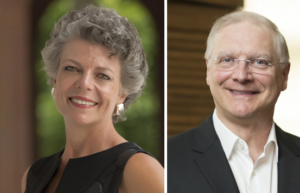I got straight A’s in Algebra 1 and 2 in high school. Piece of cake. But compared to the kids in a longitudinal study of “mathematically precocious youth” in a long-term study, I was practically a dimwit.
Those kids? Well some of them finished a year-long algebra class in three weeks . . . while in the seventh grade.
Julian Stanley, a prof at Johns Hopkins University in the 1960s and 70s, took a special interest in these math whiz kids when he met one—a brilliant 12-year-old named Joseph Bates—in the summer of 1968. As this Nature article from 2016 tells it, while taking a computer science course at Hopkins, Bates ended up teaching programming to grad students.
Stanley did some testing on the middle-school prodigy, and he scored higher on the SATs than most freshmen entering Hopkins. So Bates, then 13, enrolled at Hopkins, and became “student zero” of Stanley’s Study of Mathematically Precocious Youth (SMPY).

Camilla Benbow and David Lubinski
SMPY eventually transformed how the U.S. educational system would support gifted children, with ideas like advanced placement classes, enrolling in college (full- or part-time) early, even skipping ahead a grade or two. As a result, researchers can now show, 40 or 50 years later, that such steps have made a difference in progress for those one-time whiz kids.
SMPY officially launched in September, 1971, as a 50-year study of 5,000 “intellectually talented individuals.” The project, now 45 years old, was eventually taken over by Camilla P. Benbow and David Lubinski, both now professors at Vanderbilt University. They’ve continued the study with the help of a Templeton Grant.
Benbow and Lubinski were recently chosen to receive The International Society for Intelligence Research’s 2018 Lifetime Achievement Award for Outstanding Contributions to the Field of Intelligence. They will receive the award at the 19th Annual ISIR Conference in Edinburgh this July.
“Camilla Benbow and David Lubinski’s research has yielded unprecedented information about the life trajectories of some of our most accomplished innovators, leaders and scholars, as well those who serve their communities in many other ways,” said Vanderbilt Provost and Vice Chancellor for Academic Affairs Susan R. Wente. “The study’s findings affirm how important it is to meet the educational needs of the gifted. They are deeply deserving of this recognition.”
Learn more about the ongoing SMPY in this fascinating 14-minute documentary, Quick Learners; High Achievers:
(Top image: Shutterstock)